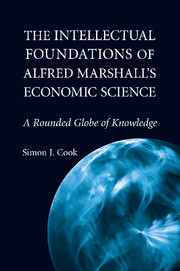Book contents
- Frontmatter
- Contents
- Acknowledgments
- List of Abbreviations
- Introduction
- PART I THE CONTEXTS OF MARSHALL'S INTELLECTUAL APPRENTICESHIP
- PART II DUALIST MORAL SCIENCE: 1867–1871
- PART III NEO-HEGELIAN POLITICAL ECONOMY: 1872–1873
- 6 A Philosophy of History
- 7 Missing Links: The Education of the Working Classes
- EPILOGUE: “A ROUNDED GLOBE OF KNOWLEDGE”
- Bibliography
- Index
- Titles in the series
6 - A Philosophy of History
Published online by Cambridge University Press: 25 October 2009
- Frontmatter
- Contents
- Acknowledgments
- List of Abbreviations
- Introduction
- PART I THE CONTEXTS OF MARSHALL'S INTELLECTUAL APPRENTICESHIP
- PART II DUALIST MORAL SCIENCE: 1867–1871
- PART III NEO-HEGELIAN POLITICAL ECONOMY: 1872–1873
- 6 A Philosophy of History
- 7 Missing Links: The Education of the Working Classes
- EPILOGUE: “A ROUNDED GLOBE OF KNOWLEDGE”
- Bibliography
- Index
- Titles in the series
Summary
SCIENTIFIC NATURALISM
In a public lecture on Babbage's calculating engines, delivered in 1872, Marshall's close friend W. K. Clifford mused on the connections between the evolution of life and the meaning of mechanism. Clifford dwelled on a feature of Babbage's working model of his difference engine that Babbage himself had made much of – the fact that the engine, in Clifford's words, “possesses the power of changing its law at a prearranged time” – for example, changing its performance from the successive addition of ones to the successive addition of twos. Babbage had apparently derived great enjoyment from the surprise of his house guests when they watched the working part of his engine so change its behavior. But he had also drawn a serious philosophical lesson from this contrivance. In his famous Ninth Bridgewater Treatise (1837), Babbage argued that the programmed discontinuities of his calculating engines had corrosive implications for the belief that sudden catastrophes were responsible for the apparent discontinuities of the geological record. Furthermore, at least in Clifford's opinion, Babbage had taken the analogy provided by his calculating engines one stage further and drawn the lesson that the mechanical laws governing inorganic matter are not, as at first sight they appear to be, “totally distinct from those of living bodies.” To illustrate the point, Clifford imagined an observer of the “long series of ages” since the world's beginning:
We know that at one time the earth must have been entirely free from living things, because it was too hot to hold them; and that they appeared as it cooled down. […]
- Type
- Chapter
- Information
- The Intellectual Foundations of Alfred Marshall's Economic ScienceA Rounded Globe of Knowledge, pp. 189 - 226Publisher: Cambridge University PressPrint publication year: 2009

